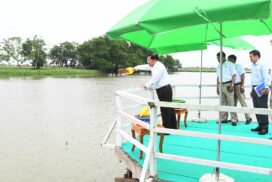Global leaders embraced a transformative vision in 2015 when they collectively adopted 17 sustainable development goals (SDGs) aimed at improving the lives of people worldwide, particularly in developing and underdeveloped nations. These goals, slated to endure until 2030, sought to address pressing issues such as poverty alleviation and food security.
Hence, both governmental and private sectors must strike a delicate balance while prioritizing poverty alleviation for the general public. Collaborative efforts are essential for steering nations toward sustainable development liberating individuals from the shackles of poverty and hunger. Stakeholders from diverse realms must critically assess their respective nations’ current situations and collectively determine effective strategies to lead people toward lives characterized by food security and poverty alleviation. Hence, all stakeholders have to review the actual situation of the nation and seek the best way how to take the people to a life of food security and poverty alleviation.
However, a recent report, drawing on evaluations from international societies affiliated with the United Nations, reveals a significant disparity between the ongoing implementation of SDGs in all countries and the intended missions set by global leaders for the years leading up to 2030. The report emphasizes the inherent challenges in fully accomplishing the goals within the specified timeframe, suggesting a potential achievement of only around 20 per cent.
Despite progress in tackling issues of poverty, starvation, and inequality, the report underscores the complexity of achieving all SDGs by 2030. Goal No 2, dedicated to eradicating hunger, particularly presents a formidable challenge, with the report acknowledging the difficulty in completely resolving global starvation issues due to persistent armed conflicts worldwide.
In addition to armed conflicts, escalating challenges posed by worsening climate change and growing societal inequalities globally compound the issues of food security and starvation. Shockingly, statistics from 2022 reveal that approximately 753 million people, constituting 9.2 per cent of the global population, experienced severe starvation.
To mitigate the immediate impact of these challenges, the United Nations, in 2022, extended food aid to 158 million people globally through the UN Food Programme. This initiative aimed to alleviate the growing tensions surrounding food security, especially in the wake of the COVID-19 pandemic and the adverse effects of climate change, including disruptions caused by El Niño and other climatic phenomena.
However, the unforeseen challenges posed by the pandemic and climate change have led to deviations and losses in numerous development projects across various countries. These disruptions have sowed doubts about the feasibility of achieving the SDGs by 2030.
Hence, both governmental and private sectors must strike a delicate balance while prioritizing poverty alleviation for the general public. Collaborative efforts are essential for steering nations toward sustainable development liberating individuals from the shackles of poverty and hunger. Stakeholders from diverse realms must critically assess their respective nations’ current situations and collectively determine effective strategies to lead people toward lives characterized by food security and poverty alleviation. Hence, all stakeholders have to review the actual situation of the nation and seek the best way how to take the people to a life of food security and poverty alleviation.














